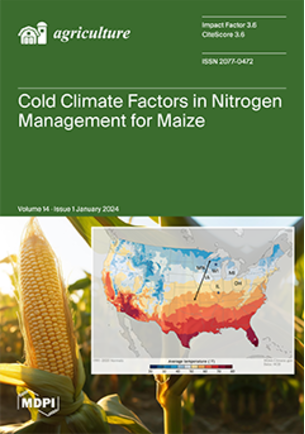Application of Protein Hydrolysate Improved the Productivity of Soybean under Greenhouse Cultivation
Q2 Agricultural and Biological Sciences
引用次数: 0
Abstract
Protein hydrolysates are plant biostimulants containing amino acids, oligopeptides, and peptides in their composition. When supplied to plants, protein hydrolysates (HPs) have been identified to improve nitrogen metabolism, enhance the activity of antioxidant enzymes, boost plant defense response to stresses, and positively impact the quantity and quality of products. Soybean is a crucial global commodity, with nitrogen being the primary nutrient for crop development as it directly affects productivity. This study aimed to evaluate the effect of an HP-based biostimulant on the N metabolism in nodulated soybean plants and their productivity. A greenhouse experiment was conducted to test two modes of application of the 0.20% HP-based biostimulant. Soybean plants, growing in pots, were treated with 0.20% HP either via seed treatment or foliar application (at growth stages V3 and V5). Activities of enzymes and compounds related to N metabolism, gene expression, and productivity components were analyzed. It was observed that the mode of application did not significantly influence the results. The application of HPs increased the concentration of nitrate, amino acids, and ureides in soybean leaves. It also positively altered the expression of genes such as nitrate reductase, urease, and asparagine. Additionally, it enhanced productivity, resulting in plants with a greater number and weight of pods and grains. Therefore, it is possible to consider HPs as a stimulator for increasing soybean productivity, even under non-stressing conditions.蛋白水解物的应用提高了温室栽培大豆的产量
蛋白质水解物是一种植物生物刺激剂,其成分中含有氨基酸、寡肽和肽。蛋白质水解物(HPs)被认为可以改善植物的氮代谢,提高抗氧化酶的活性,增强植物对胁迫的防御能力,并对产品的数量和质量产生积极影响。大豆是一种重要的全球商品,氮是作物生长发育的主要养分,因为它直接影响生产率。本研究旨在评估一种基于 HP 的生物刺激剂对有节大豆植株的氮代谢及其生产力的影响。通过温室实验,测试了 0.20% HP 生物刺激剂的两种施用模式。盆栽大豆植株通过种子处理或叶面喷施(生长阶段 V3 和 V5)接受 0.20% HP 的处理。分析了与氮代谢有关的酶和化合物的活性、基因表达和生产力成分。结果表明,施用方式对结果影响不大。施用 HPs 增加了大豆叶片中硝酸盐、氨基酸和脲苷的浓度。它还积极改变了硝酸还原酶、脲酶和天冬酰胺等基因的表达。此外,它还能提高生产力,使植株结荚和结粒的数量和重量增加。因此,即使在非胁迫条件下,也可以将 HPs 视为提高大豆产量的刺激物。
本文章由计算机程序翻译,如有差异,请以英文原文为准。
求助全文
约1分钟内获得全文
求助全文
来源期刊

Agriculture
Agricultural and Biological Sciences-Horticulture
CiteScore
1.90
自引率
0.00%
发文量
4
审稿时长
11 weeks
期刊介绍:
The Agriculture (Poľnohospodárstvo) is a peer-reviewed international journal that publishes mainly original research papers. The journal examines various aspects of research and is devoted to the publication of papers dealing with the following subjects: plant nutrition, protection, breeding, genetics and biotechnology, quality of plant products, grassland, mountain agriculture and environment, soil science and conservation, mechanization and economics of plant production and other spheres of plant science. Journal is published 4 times per year.
 求助内容:
求助内容: 应助结果提醒方式:
应助结果提醒方式:


